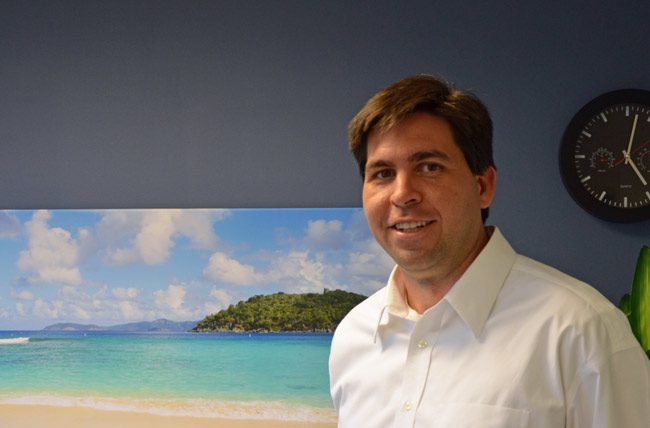
During David Ottati’s five-year tenure as CEO of Florida Hospital Flagler, which ended in 2013, the hospital vaulted to the top of the the county’s largest private-sector employers (with about 1,000 employees), recruiting 30 physicians, at a time when the county was reeling from the worst unemployment rate in the state. He oversaw the construction of a $15 million, 34,000 square-foot outpatient medical plaza, extending the hospital’s reach closer to Palm Coast Parkway.
The hospital launched a long-range fund-raising campaign under his tenure, and he was significantly involved in the county’s economic leadership, at one point chairing the board of Enterprise Flagler, the private-public economic development partnership that, by the time Ottati led it, was already doomed. But his move to Florida Hospital Waterman in Tavares was a step up to a facility almost three times larger than 99-bed FHF, and it positioned him closer to the headquarters of the hospitals’ parent company, Adventist Health Systems, in Altamonte Springs, where even then, as an article noted at the time, “his trajectory is expected to take him before long.”
It has, and that trajectory is again bringing him closer to his old grounds: last week Ottati was named regional CEO of Adventist’s Central Florida Division, North Region (previously known by a different name and led by Rob Fulbright, who died in April at age 47 of an apparent heart attack).
“The recent passing of our friend and colleague, Rob Fulbright, has left a permanent void in our hearts that will never be filled,” Terry Shaw, Adventist Health System President and CEO, was quoted as saying in a release issued last week. “There were many plans and projects that Rob was pursuing and it is important that we honor him by prayerfully selecting an executive leader that will advance Rob’s vision, as well as accelerate a seamless transition.”
That leader is Ottati.
“I am humbled to be able to come back to a community I love and be part of it, and I look forward to working with many, many friends I’ve had for years,” Ottati said in an interview with FlaglerLive on his first day on the job earlier this week. “From a living perspective I loved my living days in Flagler, I absolutely loved it, and I love the community of Flagler Beach and Palm Coast. My kids grew up on the beach there and they just absolutely loved it. That’s something we have completely missed.”
Not that he’ll be moving back to live locally: his four children are in high school, his regional office will be closer to Orange City, so it’ll make more sense for him to make the 35-40 minute commute from home every day, he said, though the work will bring him often to the the hospitals he is overseeing, including Flagler’s.

“David has been with our organization for more than two decades and has a rich history in this important region,” Shaw said. “I have strong confidence in David’s leadership abilities to drive strategy straight through to operations. That comprehensive view will be key as we look to grow our footprint in this region.”
Ottati takes over at a time of brisk uncertainty in health care: just Thursday the U.S. House of Representatives largely repealed the Affordable Care Act, which included important components on which hospitals depended for revenue, though the bill’s fate in the Senate is less certain.
“There’s constant changes in health care but there’s also things that continue to remain the same,” Ottati said. “Health care laws are changing, the way the government examines it is changing, the need for transparency on all levels of an organization, whether it’s clinical or whether it’s financial, that’s changing, so there’s a lot of components that are changing. But there are a couple of things that are very constant. One constant for instance is the need for a consumer like ourselves to have excellent care. So making sure that our quality continues to elevate is going to be constant. Another constant we see is the need to decrease the cost of health care. It’s been high. How do you turn around and reduce that from a consumerism perspective—that’s constant. We’ve seen many other industries change to deliver a product a bit more personalized and probably a bit cheaper, and health care has struggled to get there, and I think that’s a pressure we’re going to continue to face within our health care system, including Flagler.”
Ottati’s tenure in Flagler was characterized by inward but dynamic flux at the hospital, which grew rapidly and began adapting to the Affordable Care Act, which diminished significantly the financial drain the pre-ACA landscape had imposed on the hospital because of people not covered by any insurance: the hospital was obligated to care for them, by law, and cover their services. The ACA helped. It may now be gone.
Ottati said it’s too soon for him to say what changes or initiatives he may foresee for Flagler, and he doesn’t want to speak for all the people who have been doing plenty in his absence. But asked if at least the same pace of change and initiatives or developments will continue, he said: “Yes, I think so: we have very viable organizations that have focused primarily with the acute care component of health care, but I do think there’s going to be a lot more involvement in our community and a lot stronger look at how do we take care of individuals as a whole, which means the outpatient as well, and not just the in-patient. So I think a more holistic approach to health care is something that we will see.”
Never one to show his hand or even flirt with so much as an opinion of the political landscape health care is navigating, Ottati hewed closer to his Adventist-focused aims for the immediate future. “Within the Adventist Health System, Florida Hospital system, we are growing, and we want to make sure that we create a strong brand promise to all of our consumers that use our services,” he said, essentially echoing the company’s mission statement, “which is high quality, high service to all of our customers. That includes our community, our patients, our physicians and our team.”
Still, when pressed on whether the changes he’s been contending with in the industry have been for the better or for the worse, he responded as Solomon might, had Solomon been a health care CEO: “Health care regulation that is out there. Sometimes there’s really good intent, but sometimes by the time it operationalizes it can be a challenge and it actually adds more costs to the industry. So it’s hard to generalize what is the good and the bad. It’s different, we have to help mold policy as an organization to make it better. It is convoluted, I will tell you that. But it’s hard to say if it’s good or bad on every single issue. There’s clearly some issues that we would disagree with, but there’s others that whether we like it or not may be better for our consumers.”
One of the challenges–he does not seem to ever use the word “problem”–is planning in a constant state of uncertainty. “Every year we are faced with new things that change that we may not have control over,” Ottati said. “So how do we plan? Going back to some of our constants, we know, myself being a consumer and the father of four kids that use health care services, we know that as a consumer we want transparency. We want access to our clinical information quickly. We want low-cost health care. When we go from one provider to the next, from one facility to the next, we want our information, or at least I do, to be shared in a confidential way, but in a way that will elevate my experience as a health car consumer. So there’s things like that that we absolutely want, that we struggle as an industry to achieve. So when we plan we grab those that we think are pretty much absolutes in our minds and say, how do we plan for these absolutes. Health care policy may be ahead of us or may be behind us, but how do we continue to plan for things that we would want as a consumer. That’s what we try to incorporate in our planning.”
Asked more specifically about, say, a trauma center for Flagler, Ottati was comfortable suggesting that that is not in the near future. “It would be something we would examine,” he said, but not much more than that: “Normally trauma centers are at current hospitals bigger than Florida Hospital Flagler, so at this point I would not know how to answer that other than to indicate that we normally see trauma centers in much larger organizations than Florida Hospital Flagler. We do currently support the current trauma centers that we have within our community.” Flagler’s trauma center is Halifax hospital in Daytona Beach.
Ottati began his career with Adventist Health System in 1996 as a management resident. Since then, he has held various roles including program administrator for Florida Hospital for Children, administrator for Florida Hospital Wauchula and Florida Hospital Lake Placid, according to the company’s recent release.
From 2006 to 2013, Ottati served as CEO of Florida Hospital Flagler. During his tenure, he built and opened the outpatient medical plaza and oversaw the electronic clinical information system activation which designated Florida Hospital Flagler as a HIMSS Stage 7 facility – the first facility in Florida to receive this certification. In Waterman, he expanded the hospital’s cancer and cardiology services, improved physician engagement, and led Adventist Health System’s first successful implementation of iSynergy, an enterprise resource planning initiative that standardized processes across the human resources, finance, and supply chain services.





























Leave a Reply